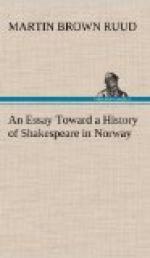The scheming Iago, too, he must have known, for he has portrayed him with matchless art. “But Othello was a mere monograph; Lear is a cosmic picture. Shakespeare turns from Othello to Lear in consequence of the necessity which the poet feels to supplement and round out his beginning.” Othello is noble chamber music; Lear is a symphony played by a gigantic orchestra. It is the noblest of all the tragedies, for in it are all the storm and tumult of life, all that was struggling and raging in his own soul. We may feel sure that the ingratitude he had met with is reflected in Goneril and Regan. Undoubtedly, in the same way, the poet had met the lovely Cleopatra and knew what it was to be ensnared by her.
Brandes, as has often been pointed out, did not invent this theory of Shakespeare’s psychology but he elaborated it with a skill and persuasiveness which carried the uncritical away.
In his second article Brandes continues his analysis of Shakespeare’s pessimism. In the period of the great tragedies there can be no doubt that Shakespeare was profoundly pessimistic. There was abundant reason for it. The age of Elizabeth was an age of glorious sacrifices, but it was also an age of shameless hypocrisy, of cruel and unjust punishments, of downright oppression. Even the casual observer might well grow sick at heart. A nature so finely balanced as Shakespeare’s suffered a thousandfold. Hence this contempt for life which showed only corruption and injustice. Cressida and Cleopatra are sick with sin and evil; the men are mere fools and brawlers.
There is, moreover, a feeling that he is being set aside for younger men. We find clear expression of this in All’s Well That Ends Well, in Troilus and Cressida. There is, too, in Troilus and Cressida a speech which shows the transition to the mood of Coriolanus, an aristocratic contempt for the mass of mankind. This is the famous speech in which Ulysses explains the necessity of social distinctions. Note in this connection Casca’s contemptuous reference to the plebeians, Cleopatra’s fear of being shown to the mob. Out of this feeling grew Coriolanus. The great patrician lives on the heights, and will not hear of bending to the crowd. The contempt of Coriolanus grew to the storming rage of Timon. When Coriolanus meets with ingratitude, he takes up arms; Timon is too supremely indifferent to do even this.
Thus Shakespeare’s pessimism grew from grief over the power of evil (Othello) and misery over life’s sorrows, to bitter hatred (Timon). And when he had raged to the uttermost, something of the resignation of old age came to him. We have the evidence of this in his last works. Perhaps, as in the case of his own heroes, a woman saved him. Brandes feels that the evolution of Shakespeare as a dramatist is to be traced in his women. We have first the domineering scold, reminding him possibly of his own domestic relations (Lady Macbeth); second, the witty, handsome women (Portia, Rosalind); third, the simple, naive women (Ophelia, Desdemona); fourth, the frankly sensuous women (Cleopatra, Cressida); and, finally, the young woman viewed with all an old man’s joy (Miranda). Again his genius exercises his spell. Then, like Prospero, he casts his magician’s staff into the sea.




